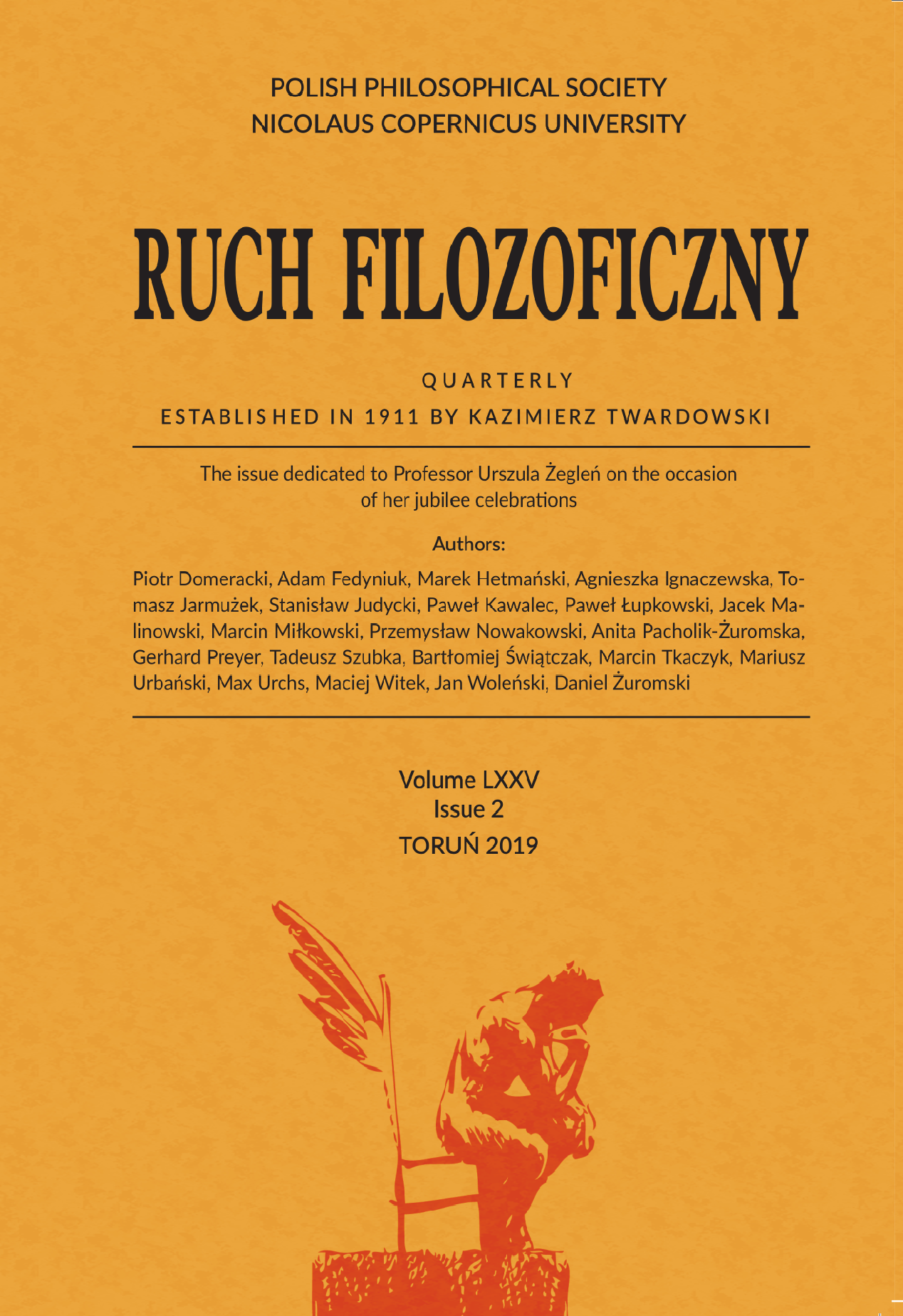Subject as Socio-Cultural Creature
DOI:
https://doi.org/10.12775/RF.2019.035Keywords
social cognition, self, subjectivity, intentionalityAbstract
In this paper, the authors develop the claim that cognitive abilities of a subject are revealed in his relations to other subjects and that the relational self is constitutive for being a subject. A subject becomes the subject owing to his being in cognitive relations with other subjects, and these relations allow him to create collective (plural) subjects: “we”. However, to achieve it , he needs to have an ability to recognize and take the perspective of other subjects. In this article, we show how these relations are realized in praxis on the basis of examples provided in psychology and philosophy. On such an interdisciplinary account, culture is understood as a collection of cumulated perspectives, due to the subject’s ability to form collective subjects. This ability also explains how, within the frame of perspectives, a subject builds his identity by assimilation of the perspectives of others in the process of enculturation, e. g. by learning.References
Andersen Susan M, Serena Chen. 2002. “The relational self: An interpersonal social-cognitive theory”. Psychological Review 109(4): 619–645.
Baron-Cohen Simon, Alan M. Leslie, Uta Frith. 1985. “Does the autistic child have a ‘theory of mind’?”. Cognition 21: 37–46.
Blanke Olaf, Thomas Metzinger. 2009. “Full-body illusions and minimal phenomenal selfhood”. Trends in cognitive sciences 13: 8–13. doi:10.1016/j.tics.2008.10.003.
Brandom Robert B. 1994. Making It Explicit. Reasoning, Representing, and Discursive Commitment. Harvard University Press.
Brandom Robert B. 2001. Articulating Reasons: An Introduction to Inferentialism. Harvard University Press.
Brandom Robert B. 2008. Between Saying and Doing. Towards an analytic pragmatism. Oxford University Press.
Brandom Robert B. 2009. Reason in Philosophy: Animating Ideas. Belknap Press of Harvard University Press.
Clark Andy, David J. Chalmers. 1998. “The extended mind”. Analysis 58: 7–19.
Deaux Kay, Tiffany S. Perkins. 2002. “Kaleidoscopic Self”. In: Individual Self, Relational Self, Collective Self. Ed. C. Sedikides, M.B. Brewer. Philadelphia: Psychology.
Dennett Daniel C. 1996. The Intentional Stance. Cambridge, Massachusetts: The MIT Press.
Dewey John A., Elisabeth Pacherie, Günther Knoblich. 2014. “The phenomenology of controlling a moving object with another person”. Cognition 132: 383–397.
Gallagher Shaun, Anthony Crisafi. 2009. “Mental institutions”. Topoi. 28(1): 45–51.
Gallagher Shaun. 2013. “The socially extended mind”. Cognitive Systems Research 25–26: 4–12.
Meyers Diana T. 2005. Decentralizing autonomy: Five faces of selfhood. In: Autonomy and the challenges to liberalism. Ed. J. Christman, J. Anderson. New York: Cambridge University Press.
Skyrms Brian. 2004. The stag hunt and the evolution of sociality. Cambridge: Cambridge University Press.
Stotz Karola. 2010. “Human nature and cognitive–developmental niche construction”. Phenomenology and the Cognitive Sciences 9 (4): 483-501.
Tomasello Michael. 1999. The cultural origins of human cognition. Harvard University Press.
Tomasello Michael, Josep Call. 1997. Primate Cognition. Oxford University Press.
Tomasello Michael. 1999. The Cultural Origins of Human Cognition. Cambridge: Harvard UP.
Tomasello Michael and Hannes Rakoczy. 2003. “What Makes Human Cognition Unique? From Individual to Shared to Collective Intentionality”. Mind and Language 18(2): 121–147.
Tomasello Michael. 2003. Constructing a Language: A Usage-Based Theory of Language Acquisition. Harvard University Press.
Tomasello Michel, Melinda Carpenter, Josep Call, Tanya Behne, Henrike Moll. 2005. “Understanding and sharing intentions: The origins of cultural cognition”. Behavioural and Brain Sciences 28: 675–691.
Tomasello Michael. 2008. Origins of Human Communication. MIT Press.
Tomasello Michael. 2014. A Natural History of Human Thinking. Cambridge, MA: Harvard University Press.
Tomasello Michael. 2016. “Precís of A Natural History of Human Thinking”. Journal of Social Ontology 2(1): 59–64.
Tomasello Michael. 2016. “Response to Commentators”. Journal of Social Ontology 2(1): 117–123.
Trevarthen Colwyn. 1980. “The foundations of intersubjectivity: Development of interpersonal and cooperative understanding in infants”. In: The social foundations of language and thought: Essays in honor of. J.S. Bruner. Ed. W.D.R. Olson. New York: W.W. Norton.
Vygotsky Lev. 1986. Thought and Language. Newly revised and edited by Alex Kozulin. (Original 1934). Cambridge, MA: The MIT Press.
Vygotsky Lev. 1999. The Collected Works of L. S. Vygotsky. Vol. VI: Scientific Legacy. Ed. R. W. Rieber. New York: Plenum Press.
Downloads
Published
How to Cite
Issue
Section
Stats
Number of views and downloads: 610
Number of citations: 0



